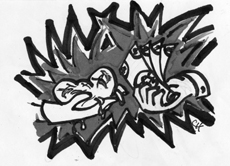Opinion: Perfect match

Chris Hampson
Oct 27, 2004
Bob Hickey has been waiting for a kidney transplant since 1999. Last week, he finally received one. The source of his new kidney, however, has created controversy within the medical community.
Robert Smitty, the kidney donor, was not a family member, friend or acquaintance of Hickey’s. Smitty was someone Bob Hickey had only ever met over the Internet.
MatchingDonors.com – the Web site used to match the two men together – charges fees to advertise for patients who are in need of organ transplants. According to Dr. Jeremiah Lowney, the director of MatchingDonors.com, profits from the advertisements only go toward maintaining the Web site.
Medical ethicists have questioned whether soliciting an organ donation over the Internet is fair or equitable. We believe, however, that as long as the Web site saves lives and is carefully monitored, there is no harm.
Under federal law, it is illegal to profit from an organ donation. MatchingDonors.com claims no one profited from the transaction, and there is no evidence to prove otherwise.
Get The Daily Illini in your inbox!
The United Network for Organ Sharing has criticized MatchingDonors.com, saying it exploits the vulnerable and subverts the waiting-list process. Yet, the national donor waiting list often has been criticized for being inefficient and ineffective.
Every 12 minutes, a new name is added to the donor waiting list. But on an average day, 17 people die because of a lack of donated organs. Each year, more than 60,000 people wait for kidney transplants, and many never receive one. It’s clear the waiting list is not working, and as a result, we welcome any opportunities to speed the process along.
As long as MatchingDonors.com regulates and screens organ donors and recipients, we don’t have a problem with it. People are more likely to donate their organs if they can personally talk to and learn about specific patients. In addition, the Web site cuts out the middleman, allowing donors and recipients to reach each other quickly and directly.
Bob Hickey paid about $300 a month during the three months before he found a matching donor. During that time, more than 500 people answered his request for a kidney. For patients who can’t afford the Web site’s fees, MatchingDonors.com works to provide them with the service anyway.
Currently, Hickey and Smitty are recovering from the operation, which was granted last Wednesday by a hesitant hospital under a “compassionate exception.” Since then, MatchingDonors.com has offered the United Network for Organ Sharing a chance to scrutinize the Web site’s matching process.
With the way technology has been advancing, it was only a matter of time before donors and recipients found each other over the Internet. As long as there’s regulation and public scrutiny, chances are slim that this process could open the door to organ harvesting or black-market organ transactions. As a result, critics should take a good look at the positive outcomes of bringing donors and recipients together, rather than the negative repercussions that might entail.





